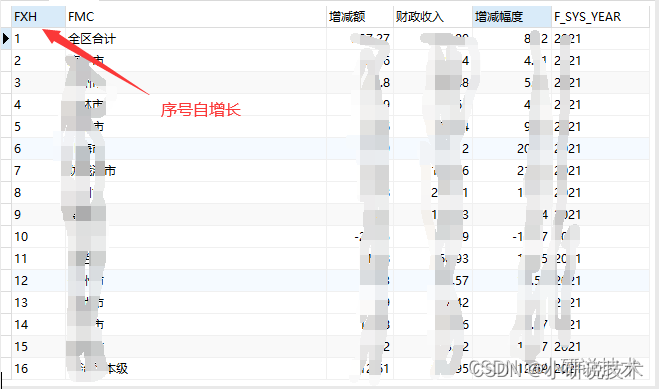oracle临时表空间无法释放的解决办法
目录
- 查询临时表空间使用率
- 解决办法一:
- 解决办法二:
- 解决办法三:
项目报错:nested exception is java.sql.SQLException: ORA-01652: unable to extend temp segment by 128 in tablespace TEMP
原因是临时表空间满了,临时表空间一直增长,未释放导致临时表空间使用率100%。
查询临时表空间使用率
--临时表空间利用率
select c.tablespace_name "临时表空间名",
round(c.bytes / 1024 / 1024 / 1024, 2) "临时表空间大小(G)",
round((c.bytes - d.bytes_used) / 1024 / 1024 / 1024, 2) "临时表空间剩余大小(G)",
round(d.bytes_used / 1024 / 1024 / 1024, 2) "临时表空间使用大小(G)",
round(d.bytes_used * 100 / c.bytes, 4) || '%' "使用率 %"
from (select tablespace_name, sum(bytes) bytes
from dba_temp_files
GROUP by tablespace_name) c,
(select tablespace_name, sum(bytes_cached) bytes_used
from v$temp_extent_pool
GROUP by tablespace_name) d
where c.tablespace_name = d.tablespace_name;解决办法一:
--压缩一下临时表空间 --自动将表空间的临时文件缩小到最小可能的大小 alter tablespace TEMP shrink space;
解决办法二:
查询临时表空间位置,创建新的临时表空间
-- 查询临时表空间位置
SELECT FILE_ID,
TABLESPACE_NAME "临时表空间名",
BYTES / 1024 / 1024 / 1024 "表空间大小(G)",
FILE_NAME "文件路径"
FROM DBA_TEMP_FILES
order by TABLESPACE_NAME, FILE_NAME;
-- 例如查询结果如下:
-- /dev/shm/oradata/temp01.dbf
-- 创建新的临时表空间最好也放在这个目录下
-- 创建临时表空间
create temporary tablespace IRFS_TEMP
tempfile '/dev/shm/oradata/irfs_temp01.dbf'
size 20g
autoextend off;切换临时表空间为新的临时表空间,切换后删除原来的临时表空间。
-- 设置数据库的默认临时表空间,切换临时表空间 alter database default temporary tablespace IRFS_TEMP; --查询默认的临时表空间 SELECT PROPERTY_NAME, PROPERTY_VALUE FROM DATABASE_PROPERTIES WHERE PROPERTY_NAME='DEFAULT_TEMP_TABLESPACE'; -- 删除原来的临时表空间(包括文件) drop tablespace TEMP including contents and datafiles;
解决办法三:
前两种方案,需要每隔一段时间就要去手动操作一次。
哪些情况会占用临时表空间?
1、当数据库执行如CREATE INDEX、ORDER BY、GROUP BY等操作时,如果内存中的排序区域大小不足,就会将数据放入临时表空间中进行排序。
2、操作CLOB或BLOB字段时,如果内存中的空间不足以容纳这些数据,Oracle会将这些数据放入临时表空间。
查询临时表空间占用sql
--查询临时表空间占用sql
SELECT se.username,
se.sid,
se.serial#,
se.SQL_ID,
se.sql_address,
se.machine,
sa.SQL_TEXT,
sa.SQL_FULLTEXT,
se.program,
su.tablespace,
su.segtype,
su.contents
FROM v$session se,
v$sort_usage su,
v$sqlarea sa
WHERE se.saddr=su.session_addr and se.SQL_ID=sa.SQL_ID
表空间的释放通常依赖于事务提交或会话的断开。
事务的提交释放了事务占用的资源,包括临时表空间中的空间。
会话的断开也会释放该会话使用的表空间。
因此,如果临时表空间没有被释放,并不是由于自动扩展设置的原因。
在查找表空间未释放的原因时,您应该关注未提交的事务或仍然处于活动状态的会话。
对于临时表空间的释放问题,您可以继续检查未提交的事务或会话,并确保它们被正确提交或断开连接。
我的Oracle数据库版本是11gR2(11.2.0.4)
我这里是由于clob或者blob字段造成的。
具体原因是clob或者blob字段使用后会占用临时表空间,如果连接不断开就不会释放,只要想办法让连接使用后断开就行。
我使用了druid连接池,由于我的业务一天24小时都会使用,所以连接池中的连接一直处于活跃状态,没有到达配置的空闲5分钟删除掉连接,
当然也可以从空闲时间参数入手让空闲时间短点就删除掉连接,一句话就是想办法让连接断开,但是频繁的创建连接也不好那连接池也没有意义了。
解决思路,不要使用clob或者blob字段,想办法使用其它方案替代,我这里必须要用到clob,又没有找到替代方案。
我后面解决思路是,写了一个定时器,10分钟检测一次连接池,连接存活时间超过1天,就删除该连接,且一次最多删除一个连接防止把连接池清空了。该方案自行评估有无风险!
package com.study.pool;
import com.alibaba.druid.pool.DruidDataSource;
import com.alibaba.druid.pool.DruidPooledConnection;
import lombok.extern.slf4j.Slf4j;
import org.springframework.beans.factory.annotation.Autowired;
import org.springframework.jdbc.core.JdbcTemplate;
import org.springframework.jdbc.datasource.DataSourceUtils;
import org.springframework.scheduling.annotation.EnableScheduling;
import org.springframework.scheduling.annotation.Scheduled;
import org.springframework.stereotype.Component;
import javax.sql.DataSource;
import java.sql.Connection;
/**
* 清理连接存活时间超过1天的连接
* 由于clob和blob字段导致临时表空间不释放,需要定期清理连接
* @Date: 2024/2/29 16:49
*/
@Slf4j
@Component
@EnableScheduling
public class DruidPooledClear {
@Autowired
private JdbcTemplate jdbcTemplate;
// @PostConstruct
@Scheduled(cron = "25 1/10 * * * ?") //10分钟一次
public void clearConnection() {
try {
DataSource dataSource = jdbcTemplate.getDataSource();
if (dataSource instanceof DruidDataSource) {
DruidDataSource druidDataSource = (DruidDataSource) dataSource;
clearConnection(dataSource, druidDataSource);
}
} catch (Exception e) {
log.error(e.getMessage(), e);
}
}
/**
* 清理连接,1次只清理一个连接,防止一次性把连接池清空
* @date 2024/2/29 16:59
*/
private void clearConnection(DataSource dataSource, DruidDataSource druidDataSource) {
DruidPooledConnection druidPooledConnection = null;
try {
// 由于druidDataSource.getConnection()总是获取上一次使用的连接(最后一次使用的连接),无法遍历空闲连接,只有使用递归才获取所有空闲连接
druidPooledConnection = druidDataSource.getConnection();
// log.info("连接:" + druidPooledConnection.getConnectionHolder());
// 连接创建单位:毫秒
long connectedTimeMillis = druidPooledConnection.getConnectionHolder().getConnectTimeMillis();
// 删除连接,连接存活时间超过1天
if (System.currentTimeMillis() > connectedTimeMillis + 1000 * 60 * 60 * 24) {
log.info("删除连接:" + druidPooledConnection.getConnectionHolder());
// 这一步很关键,druidPooledConnection.getConnection() 取出的连接,已经不能归还给连接池了
Connection connection = druidPooledConnection.getConnection();
// 从连接池中移除连接
DataSourceUtils.releaseConnection(connection, dataSource);
} else {
// int activeCount = druidDataSource.getActiveCount();//活跃连接数
int poolingCount = druidDataSource.getPoolingCount();//空闲连接数
// log.info("池中连接数:{},活跃连接数:{},空闲连接数:{}", activeCount + poolingCount, activeCount, poolingCount);
if (poolingCount > 0) {
clearConnection(dataSource, druidDataSource);
}
}
} catch (Exception e) {
log.error(e.getMessage(), e);
} finally {
// 归还连接给连接池
DataSourceUtils.releaseConnection(druidPooledConnection, dataSource);
}
}
}


